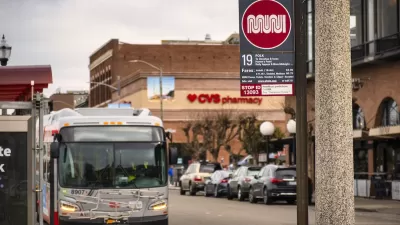There are no emissions of pollutants or noise from these electric buses that receive power from overhead wires; but it's the wires that are viewed by some as visual pollution. Powered from the city's hydroelectric dam, they are truly carbon-free.
The electric trolley buses, dating back to 1935, may have more in common with the electric streetcars that plow Market Street and the Embarcadero in San Francisco than with new, battery-electric buses that are just entering the marketplace, e.g. New York. But for some, that day can't come soon enough for San Francisco.
"It's visual pollution," said Anne Brubaker, a founder of the San Francisco Coalition to Underground Utilities. "We're living in what should be one of the most beautiful cities in the world, but you can't see it for all the wires."
For the record, "(t)rolley coaches (also known as 'trolley buses' or 'trackless trolleys') are rubber-tired vehicles with motors powered by electricity from overhead wires. 'Trolley' refers to the trolley poles on the roof of the bus that are used to transmit the electricity from the overhead wires," according to the San Francisco Municipal Transportation Agency.
However, from Muni's perspective, it's not just a matter of being green for green's sake. Trolley buses offer advantages over the diesel-powered buses in the transit agency's fleet. San Francisco's famous hills, while scenic, pose major challenges to transit vehicles, as well as human-powered ones.
"You have to ask whether the visual pollution is more important than the operational advantages of the trolleys," said John Haley, director of transit for the San Francisco Municipal Transportation Agency. "For example, it's impossible for buses to get up the grade of California Street."
Supervisor Scott Weiner offered first-hand testimony to that effect.
I take the 24 (Divisadero) line, and sometimes Muni has to use a regular bus on the route," Weiner said. "There are times when that bus can barely make it up the hills."
John Wildermuth writes that "San Francisco is one of the few cities in the country that still uses electric trolleys, joined by Seattle, Boston, Philadelphia and Dayton, Ohio. Muni's fleet of 311 trolleys (out of about 1,100 total transit vehicles) is the nation's largest."
Ultimately, it may come down to "the visual pollution versus the measurable and real pollution from even the cleanest of diesel vehicles," as SFMTA's Haley put it. Throw in operational superiority, on hills at least, and the San Francisco Coalition to Underground Utilities might want to stick with power lines, not overhead wire for the city's trolley buses, at least until battery-electric buses prove themselves.
Note: See District of Columbia's struggle with this issue in "Related" below.
FULL STORY: Muni trolley wire 'visual pollution' electrifies debate

Planetizen Federal Action Tracker
A weekly monitor of how Trump’s orders and actions are impacting planners and planning in America.

Maui's Vacation Rental Debate Turns Ugly
Verbal attacks, misinformation campaigns and fistfights plague a high-stakes debate to convert thousands of vacation rentals into long-term housing.

Restaurant Patios Were a Pandemic Win — Why Were They so Hard to Keep?
Social distancing requirements and changes in travel patterns prompted cities to pilot new uses for street and sidewalk space. Then it got complicated.

In California Battle of Housing vs. Environment, Housing Just Won
A new state law significantly limits the power of CEQA, an environmental review law that served as a powerful tool for blocking new development.

Boulder Eliminates Parking Minimums Citywide
Officials estimate the cost of building a single underground parking space at up to $100,000.

Orange County, Florida Adopts Largest US “Sprawl Repair” Code
The ‘Orange Code’ seeks to rectify decades of sprawl-inducing, car-oriented development.
Urban Design for Planners 1: Software Tools
This six-course series explores essential urban design concepts using open source software and equips planners with the tools they need to participate fully in the urban design process.
Planning for Universal Design
Learn the tools for implementing Universal Design in planning regulations.
Heyer Gruel & Associates PA
JM Goldson LLC
Custer County Colorado
City of Camden Redevelopment Agency
City of Astoria
Transportation Research & Education Center (TREC) at Portland State University
Jefferson Parish Government
Camden Redevelopment Agency
City of Claremont




























